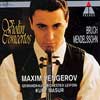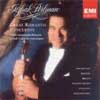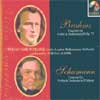Brahms/Schumann Violin Concertos
View record and artist detailsRecord and Artist Details
Composer or Director: Felix Mendelssohn, Max Bruch
Label: Teldec (Warner Classics)
Magazine Review Date: 4/1994
Media Format: CD or Download
Media Runtime: 51
Mastering:
DDD
Catalogue Number: 4509-90875-2

Tracks:
| Composition | Artist Credit |
|---|---|
| Concerto for Violin and Orchestra No. 1 |
Max Bruch, Composer
Kurt Masur, Conductor Leipzig Gewandhaus Orchestra Max Bruch, Composer Maxim Vengerov, Violin |
| Concerto for Violin and Orchestra |
Felix Mendelssohn, Composer
Felix Mendelssohn, Composer Kurt Masur, Conductor Leipzig Gewandhaus Orchestra Maxim Vengerov, Violin |
Composer or Director: Ludwig van Beethoven, Nicolò Paganini, Pyotr Ilyich Tchaikovsky, Felix Mendelssohn, Max Bruch, Johannes Brahms
Label: EMI
Magazine Review Date: 4/1994
Media Format: CD or Download
Media Runtime: 211
Mastering:
DDD
ADD
Catalogue Number: 764922-2

Tracks:
| Composition | Artist Credit |
|---|---|
| Concerto for Violin and Orchestra |
Ludwig van Beethoven, Composer
Carlo Maria Giulini, Conductor Itzhak Perlman, Violin Ludwig van Beethoven, Composer Philharmonia Orchestra |
| Concerto for Violin and Orchestra No. 1 |
Max Bruch, Composer
(Royal) Concertgebouw Orchestra, Amsterdam Bernard Haitink, Conductor Itzhak Perlman, Violin Max Bruch, Composer |
Composer or Director: Robert Schumann, Johannes Brahms
Label: Classics
Magazine Review Date: 4/1994
Media Format: CD or Download
Media Runtime: 71
Mastering:
DDD
Catalogue Number: PCD1062

Tracks:
| Composition | Artist Credit |
|---|---|
| Concerto for Violin and Orchestra |
Johannes Brahms, Composer
Adrian Leaper, Conductor Johannes Brahms, Composer London Philharmonic Orchestra Takayoshi Wanami, Violin |
Author: Edward Greenfield
The performance of the Bruch, though very fine, with all of the same qualities, does not convey quite the same electricity. It still compares with the outstanding versions I have listed above and, as in the Mendelssohn, the speeds for the first movement, marginally faster and steadier than usual, add to its strength, while equally the slow movement gains from being taken at a flowing speed. Vengerov, 20 this year, may still be young, but at the opening of the Adagio he finds a rare depth of expressiveness, which makes the movement a meditation rather than simply a lyrical interlude. With outstanding recorded sound, warm yet clear and detailed, there is now no more recommendable disc of this favourite coupling.
For my comparisons I have naturally included the Perlman versions chosen for EMI's mid-price compilation of six romantic concertos as detailed above, both with Haitink and the Concertgebouw. These are more solid, marginally less fanciful than those he recorded earlier with Andre Previn and the London Symphony Orchestra (HMV, 1/74—nla), and I am sorry those accounts were not chosen in preference. Even so, the Concertgebouw performances are powerfully convincing, with the emotional thrust of the Bruch particularly strong. One might also quibble over the choice of Perlman's earlier HMV recordings of the Beethoven and Brahms, both with Giulini as conductor, rather than his later EMI versions, recorded live with Barenboim conducting (11/89 and 2/93). Those with Giulini may not convey the electricity of a live event, but, even at spacious speeds, they remain among the most powerfully concentrated accounts in the catalogue. There is a comparable command in the versions here of the Tchaikovsky and Paganini. The latter, dating from 1972, remains one of Perlman's most spectacular recordings, dazzling in its carefree virtuosity, and the analogue sound gives a sharper sense of presence than some of the digital recordings in the collection. As the booklet indicates, the first movement has a few traditional cuts. Altogether the three discs make an excellent bargain.
It says much for the brilliance and concentration of the Japanese violinist, Takayoshi Wanami in the Brahms that even in direct comparison with Perlman, his claims are still impressive. In the tutti Adrian Leaper draws bright, intense playing from the LPO, leading to a strong, positive first entry from the soloist. Wanami's coloration is not always ideally pure, even if his intonation is at all times secure, whether on or above the stave. At a speed noticeably faster than Perlman's, more clearly keeping the feeling of Allegro non troppo, the movement is held cleanly together, with the simple lyricism of the tranquillo coda most beautifully phrased, if not at a hushed pianissimo. Again, in the central Adagio Wanami adopts a more flowing speed than Perlman, naturally songful, while with very clean passagework and with full, vivid orchestral recording, the finale has all the bite and swagger needed in a Hungarian dance.
After this it is a pity that Wanami is let down by the orchestra in the still relatively rare Schumann concerto. His feeling for this difficult work is plain throughout, not least in the lovely slow interlude of the second movement, but after a lacklustre account of the opening tutti, the LPO never recaptures the bite of its playing in the Brahms. In flair and imagination this version cannot compare with the excellent Kremer (with Muti and the Philharmonia), now at mid-price and coupled with the Sibelius but, particularly at mid-price, one might simply regard the Schumann as a very generous makeweight for a highly enjoyable account of the Brahms.'
Discover the world's largest classical music catalogue with Presto Music.

Gramophone Digital Club
- Digital Edition
- Digital Archive
- Reviews Database
- Full website access
From £8.75 / month
Subscribe
Gramophone Full Club
- Print Edition
- Digital Edition
- Digital Archive
- Reviews Database
- Full website access
From £11.00 / month
Subscribe
If you are a library, university or other organisation that would be interested in an institutional subscription to Gramophone please click here for further information.




